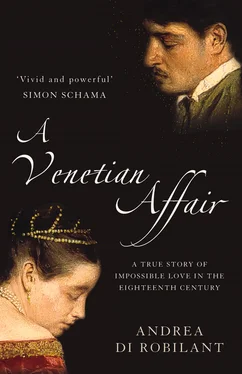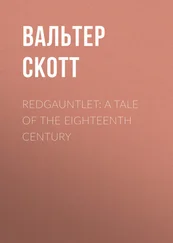It is easy to see Mrs. Anna in the role of the insensitive and overly censorious mother—a tyrant, as the two lovers called her. But she had good reason to be firm. She was a woman of experience who had worked hard to gain respectability, and she well understood the intricate workings of Venetian society, in which the interests of the ruling families were supreme. She was also very much aware of Andrea’s special place in that society—and what a formidable opponent he was in her struggle to protect her daughter.
The Memmos were among the founding fathers of Venice in the eighth century—historians have even traced the lineage of Andrea’s family as far back as the gens Memmia of Roman times. There was a Memmo doge as early as the year 979, and over the next eight centuries the family contributed a steady flow of statesmen and high-ranking public servants to the Republic. By Andrea’s day they were still very influential in Venetian politics—an elite within the elite, at a time when many other patrician families living in the city had become politically irrelevant. * But they were not among the richest families; by the 1750s, their income had dwindled to about 6,000 ducats a year, and they would have needed at least double that amount to face comfortably the expenditures required of a family of such elevated rank (the wealthiest families had incomes ten times as large). They earned barely enough from their estates on the mainland to live with the necessary decorum at Ca’ Memmo, the large family palazzo at the western end of the Grand Canal. 1
Andrea’s father, Pietro Memmo, was a gentle, virtuous man long weakened by ill health. His mother, Lucia Pisani, came from a wealthy family that had given the Republic its greatest and most popular admiral—the fierce Vettor Pisani, who had saved Venice from the Genoese in the fourteenth century. Pietro was always a rather remote figure—he and Andrea could find little to say to each other—and Lucia was not especially warm with her children either; her stiff manner was fairly common among the more old-fashioned patrician ladies of that time. Nevertheless, she was by far the more forceful of the two parents, and Andrea felt closer to her than he did to his father. The one person in the family he truly adored was Marina, his older sister by six years: a sensitive, kind-hearted young woman whom he could always confide in. Andrea had two brothers: Bernardo, who was one year younger than him, and Lorenzo, who was four years younger. The three boys, being fairly close in age, spent much of their time together when they were growing up. There was also a younger sister, Contarina.
The family patriarch was Andrea Memmo, Andrea’s venerable uncle, known for his courage and strength of character; he had been imprisoned and tortured by the Turks while he was ambassador to Constantinople in 1713. The senior Andrea served the Republic with great distinction and ended his political career as procuratore di San Marco, the second most prestigious position in government after the supreme office of doge. He went on to become a respected elder statesman whom his peers considered “possibly the greatest expert in Venetian matters.” 2 He died at the age of eighty-six in 1754—the same year Andrea and Giustiniana’s secret love affair began.
Andrea’s uncle ruled over the family with a steady hand for decades, overseeing everything from political alliances to business decisions, from household expenses to the education of the younger Memmos. During his long stewardship, Ca’ Memmo was known for its strong attachment to tradition. But it was also considered a progressive house where writers, artists, and composers were always welcome. The new ideas from Paris, especially the political writings of Montesquieu (Venetians had a predilection for anything involved with the machinery of government), were discussed spiritedly at the dinner table. * Their friend Goldoni, the great playwright, was a frequent lunch guest. So was the German composer Johann Adolph Hasse, the “divine Saxon” who had married the diva Faustina Bordoni and ran the music conservatory at the Incurabili, one of the hospices where young orphans were trained as musicians and singers.
Very early on, Andrea senior had chosen his favorite nephew and namesake as his successor. Over the years he instilled in him a sense of duty toward family and nation that would remain with him all his life. And he prepared him for a career in the service of “our wise Venetian Republic, which has seen the largest and wealthiest kingdoms fall over the past ten centuries and more, and yet has managed to stand firm amid everyone else’s misfortune.” 3
Andrea received his first formal education from Eugenio Mecenati, a Carmelite monk who worked as preceptor in several patrician families. But his mind wasn’t really turned on until he met Carlo Lodoli, a fiery and charismatic Franciscan monk. During the 1740s Lodoli established himself as Venice’s controversial resident philosopher. He was a brilliant scholar and teacher, equally at ease talking to his students about astronomy, philosophy, or economics. Lodoli’s great passion was architecture, a field in which he applied the principles of utilitarianism to develop his own visionary theories about function and form. Wrapped in his coarse habit, the monk had a rugged, unkempt look about him that could be quite intimidating: “The red spots on his face, his wild hair, his unshorn beard, and those eyes like burning coals—he very nearly scared off the weaker spirits,” 4 Andrea wrote many years later. Lodoli’s disciples came from the more enlightened families in Venice. He never wrote books but kept students under his spell through the force of his personality and the probing power of his Socratic “conversations.” His mission, as he saw it, was to open the mind of young patricians. The Venetian authorities were wary of the strong influence the monk had on his disciples. But Lodoli was not interested in subverting the established political order, as his conservative critics suggested: he wanted to improve it—by improving the men who would soon be called upon to serve the Republic.
Andrea remained devoted to Lodoli all his life, but the moral rigor of the Franciscan, his ascetic lifestyle, could be a little hard going. It is easy to see why Andrea’s sensual side was somewhat starved in his company, and why he spent more and more of his time in the splendid house-museum of Consul Smith on the Grand Canal, just a short walk down the street from Ca’ Memmo. He spent hours studying the vast collection of paintings and sculptures the consul had assembled over the previous thirty years and happily buried himself in the library—an exceptional treasure trove of classics and moderns in beautifully bound volumes.
Smith had arrived in Venice in the early years of the century, when the city still attracted a good number of foreign merchants and businessmen. He had gone to work for the firm of his fellow Englishman Thomas Williams and had been successful enough to take over the company when Williams retired a few years later and returned to England. Smith went on to build a considerable fortune trading in the East, buying goods from Venetian merchants and selling them on the British market. In 1717 he married Catherine Tofts, a popular singer who had made a name for herself in the London theaters before coming to Venice. Wealthy and well connected, Catherine was certainly the major drawing card of the Smith ménage in the early years of their marriage. But over time she gradually withdrew from society, perhaps never recovering from the loss of their son, John, who died in 1727 at the age of six.
As his business flourished, Smith purchased Palazzo Balbi, which he had rented ever since his arrival in Venice, and commissioned the architect Antonio Visentini, a friend and protégé, to renovate the façade. After some plotting within the English community in Venice and a great deal of pleading with the government in London, he eventually obtained the consular title in 1740. Much to his chagrin, he never became the British Resident (ambassador).
Читать дальше












